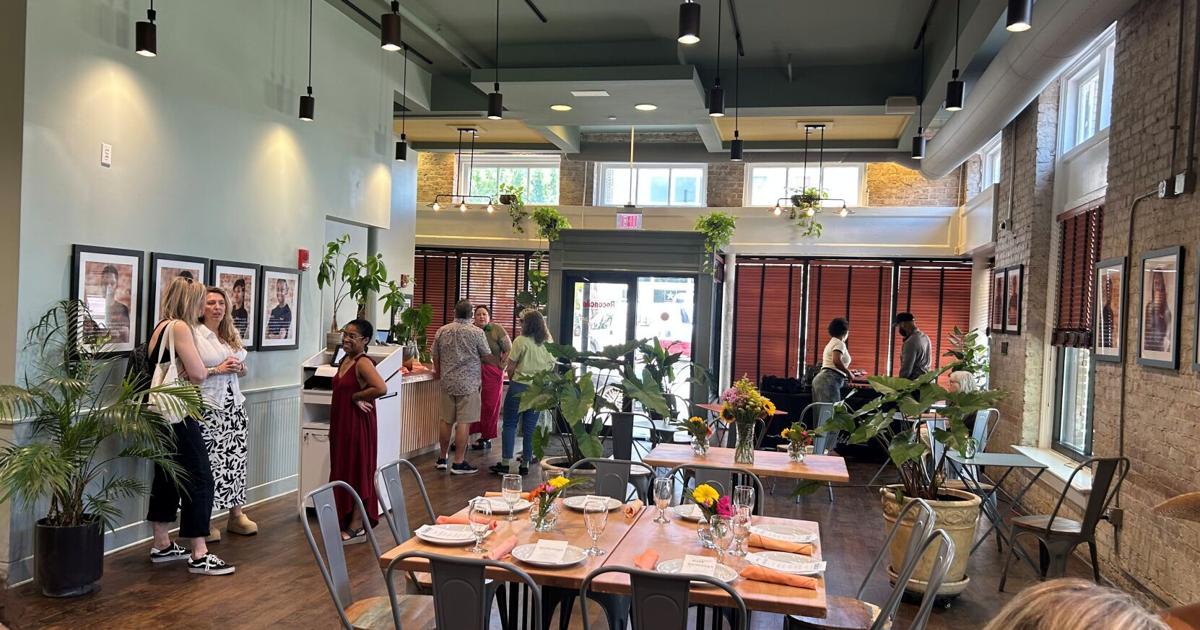
Look, up in Central City! It’s a job training center. It’s life-skills development. It’s a neighborhood redevelopment catalyst. It’s a really, really good restaurant. And now this Super-organization is turning 25 years old, with no Kryptonite in sight.
When Café Reconcile, on the corner of Oretha Castle Haley Boulevard and Euterpe Street, hosts a “SUNday Social” mega-celebration on the afternoon of Sept. 28, it will highlight a super success story in which public sector grants, major and minor private philanthropy and free-market lessons and practices combine in one remarkable enterprise.
More simply: Yeah, this is good stuff.
Reconcile, New Orleans, grew from the efforts of the Rev. Harry Thompson, S.J., and parishioners Craig Cuccia and Tim Falcon of downtown’s Immaculate Conception Catholic parish. The goal was to be what its website calls “the cornerstone for the broader rehabilitation” of the nearby Central City neighborhood. Describing itself as a “non-profit workforce training program,” Reconcile takes interested 16 to 24-year-olds for internships in a fabulous lunch restaurant featuring New Orleans standards such as red beans, gumbo, catfish and po-boys.
The restaurant’s reputation deservedly is national: First Lady Laura Bush ate there shortly after Hurricane Katrina, and in 2023 the New York Times listed it among the 50 restaurants in the whole country “that we’re the most excited about right now.”
Yet the restaurant is just the first floor of a five-story building. Sandwiched between it and the fifth-floor administrative staff is a second-floor event space and catering operation; a third-floor classroom and “case management” area teaching interpersonal skills that can apply to almost any job; and a fourth-floor employment and career-readiness center that helps participants figure out and pursue their next career steps, including where to access related resources, after they complete the Reconcile program.
The program itself involves a 14-week internship (with stipend) at the restaurant followed by a full year of engagement to help graduates take their next career steps. In 25 years the program has produced more than 2,000 graduates and sent them not just into the restaurant and hospitality industry — not to belittle that, because the record there is terrific — but also into jobs in fields as varied as health care, a pipefitter’s union and veterinary practice.
“This place is never quiet,” said Reconcile CEO Kheri Billy.
“There is data … that young people are leaving the city and the state, [but] we are talking about developing the next generation of talent,” Chief Program Officer Monique Robinson told WDSU-TV recently. “We want home-grown talent to stay here, whether it’s in the hospitality and tourism industry or not.”
On the same WDSU program, graduate Kennan Jordan spoke about how he previously had been “moving around a lot, just not having a stable place to be,” including stints in Lafayette and in Texas. “It was hard for me to have my feet grounded somewhere.”
Now, though, repeatedly calling his Reconcile experience “life changing,” he said it gave him “the first step of dedication and just being somewhere that I mattered.” Now he has a steady job at a top-notch New Orleans restaurant.
Meanwhile, Café Reconcile served as one of two anchors — the other being the Ashe Cultural Arts Center across the street, founded in 1998 — that led to a revitalization of the previously blighted neighborhood. For a radius of several blocks in any direction, once-dilapidated properties now feature handsome buildings with solid businesses and plenteous foot traffic.
Billy, the CEO, is a New Orleans native. She said she remembers being a little girl shopping in the area with her mother at a “jazz market” and “little eatery,” but “in the 1990s, it had gone dark” while “there was a huge crime wave all over the city.” But then came the team from Immaculate Conception, buying the building that now houses Reconcile with the express purpose of using it for area youth, along with Mayor Marc Morial using community-action block grants.
“I was in school at the time,” Billy said. “And I remember Reconcile very clearly coming into the community.”
Now Reconcile alone pays taxes to the city on about $380,000 in gross annual sales, not to mention all the similar benefits provided by the businesses that grew around it.
This is how, neighborhood by neighborhood, communities can be rebuilt. Government has a role, but that role need not be controlling. Government can provide a little leverage and grant help, and then watch as private philanthropy and private enterprise work wonders.
Thirty years ago, this was the sort of thing on which Republicans such as former vice-presidential nominee Jack Kemp and Democrats such as New York’s Sen. Daniel Patrick Moynihan found meetings of the mind. Café Reconcile should serve as a model for others, one well worth celebrating.



